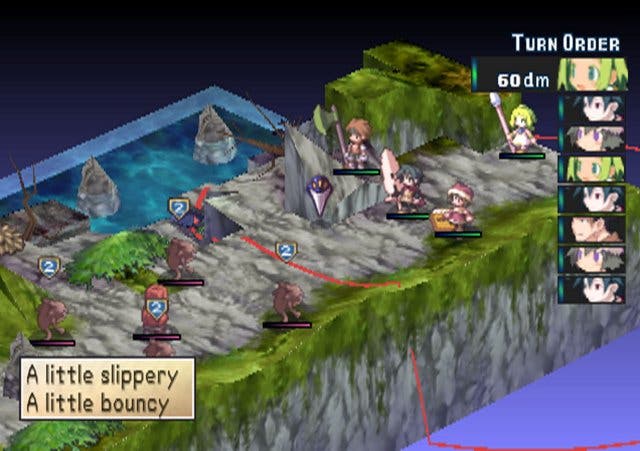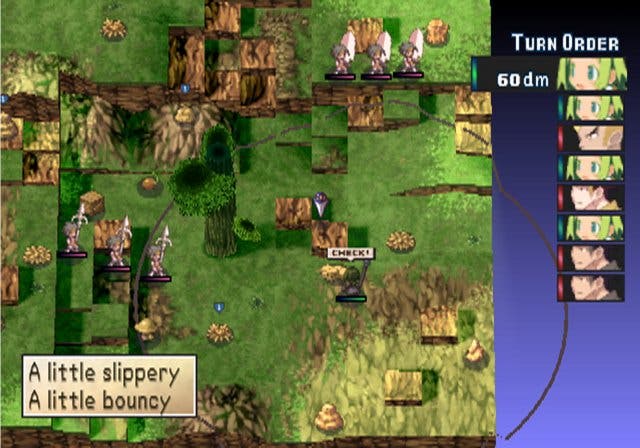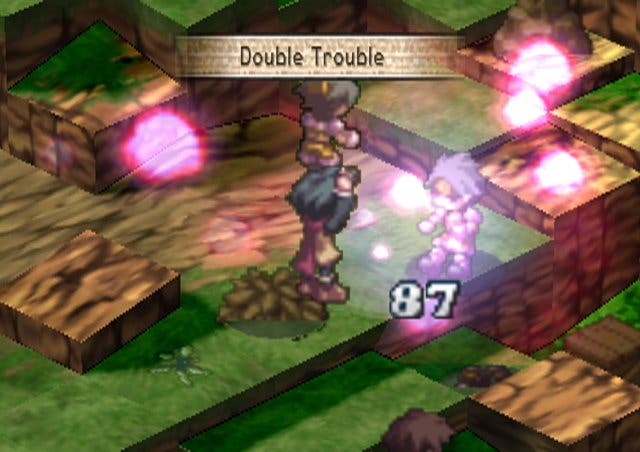Phantom Brave
Review Revisited! Phantom Brave is out today, so here's another chance to read our review. This article originally posted 21st October 2004.
This review was originally published on 21st October 2004 and based on the US version of Phantom Brave. The PAL version of the game sadly does not feature a 60Hz switch, although the impact on this sort of game is minimal so it's only worth mentioning in passing and doesn't affect our final conclusions. As a bonus for European gamers, every copy of the game ships with a free soundtrack CD - which was available in the US only if you pre-ordered - which is nice!
Games, like almost every other form of media, are about conflict. When you play a videogame, you're playing it because you're drawn in by that aspect; the battle between two opposed forces, the fight for freedom, or survival, or money, or fame, or the attentions of the love interest. It may come dolled up in fine clothes and wearing fancy perfume, but the core of our gaming experiences, however sophisticated, is conflict - and in games, perhaps more so than other mediums, that is generally expressed in the simplest terms possible, namely Hitting The Other Person Very Hard With An Object.
The object in question, and the nature of the player interaction which leads up to the blow, gives us the concept of the game "genre" - so, for example, you have sharp pointy objects which are wielded with a menu system, and we call this an RPG, and you have small, metallic and very fast objects which are launched with a mouse click, and we call this a first-person shooter. And then you have... Well, then you have Phantom Brave, the latest game from the warped imaginations at Nippon Ichi - last seen running away cackling with evil laughter after breaking our minds with the fantastic and often-hilarious turn-based strategy title Disgaea.
Tree to Face Intersection

It's not that Phantom Brave defies classification into a genre. This is quite distinctly turn-based strategy, and the core elements of a Nippon Ichi game are all present and correct. Startlingly deep but yet easy to learn gameplay? Check. 2D sprite-based characters? Check. Quirky artwork and superb animation? Check. Random dungeons to allow you to level up your party to a ridiculous extent? Check. Special attacks that make Final Fantasy's more outlandish 'summons' look like the fireworks that the annoying little tykes down the road keep setting off at night in the run up to Halloween? Check!
No, the jaw-dropping thing about Phantom Brave is the objects. If the quality of a game is to be measured by the range of different items available to knock your opponents around the head with, then this is truly the prince of all games; the divine mould from which all others should be crafted. Everything is a weapon. Rocks are weapons. Trees are weapons. Starfish are weapons. Mushrooms are weapons. Cows are weapons. Your enemies are weapons. Your allies are weapons. Occasionally - but pretty rarely, we have to say - even genuine weapons are weapons.
How the blazes does that work? Let's start from the beginning, because this is all just a little bit weird. You play as Ash, a brave warrior who snuffed it in a battle several years ago - but as a final act, one of your (also snuffing it) companions bound your soul to this world, preventing you from dying but rather hampering the whole living thing as well, as you no longer have a body, existing instead as a phantom. Phantom Brave, see? Ever since then, you have watched over Marona, the daughter of your erstwhile companions, who has the power to see, converse with and summon phantoms, but unfortunately is about as bright as a box of rocks.
Summon Knights

Marona works as a Chroma, essentially a mercenary, in a world made up largely of islands, and has the power to confine phantoms in inanimate objects - which is how the battle system works. Marona is your only human character - everyone else who fights for you is a phantom, and must be confined into an object by Marona before he or she can do anything useful. So you start off a level with only Marona surrounded by bad guys, and she must make use of the various items on the landscape around her - rocks, trees and suchlike - by confining phantoms in them, effectively summoning them onto the battlefield. They then remain summoned for a set number of turns, before disappearing again - leaving the inanimate object from which they came sat on the landscape once more.
The range of different characters you can summon increases greatly over time - you start off with just Ash and a few defaults, but gradually end up with a host of characters (all of whom stand around on your home base of Phantom Island, some of them providing useful services such as access to randomly generated dungeons for levelling up or healing for your party members and items, others just making increasingly inane comments) taken from a wide variety of different classes. However, what's perhaps more interesting than the characters themselves is the items they can use - since in this game, items level up in exactly the same way as characters do, and often with more dramatic effects.
In fact, items not only level up, but they also have hitpoints, take damage, and can be removed from battle if "killed," and they learn new abilities as they level up (although for some, you'll need to apply the crafty hands of the blacksmith). By items, we don't just mean the swords, clubs, magic spellbooks and magicians' staves you can buy at your armoury, either - in fact, they're just the tip of the iceberg. Everything is a weapon, remember? Each object has two sets of statistics - the effect of confining a phantom in it (which boosts some stats of the phantom and the expense of others), and the effect of equipping it.
So, for example, you might be surrounded by slimes and have no weapon in your hands? Never fear - pick up a nearby rock and smash it into them! Or a tree. Or a flower. Or a starfish. Each of these items gives you a number of attacks, just like your weapon items do, but can also be acquired in perpetuity, levelled up, and become an exceptionally powerful weapon in its own right. Sounds daft? It is, but it opens up massive possibilities in the game, because everything on the battlefield is potentially either a summoning point, or a lethal weapon.
Going off-road

As if all that wasn't odd enough, Phantom Brave also breaks one of the fundamentals of turn-based strategy by removing the grid from the maps. No longer are your moves and attacks calculated in terms of squares; instead, you can move wherever you like within a certain circle, and attacks are calculated using a wireframe 3D shape which shows the area of effect and range of your planned move. It's a system that works surprisingly well, although it can become quite confused at times, and while it definitely makes battles look more natural and maps more interesting, we're agnostic on whether it's actually a step forward for the Nippon Ichi formula or just a gimmick.
Fans of Disgaea will be pleased to note that everything which endeared the adventures of Laharl and company to them is reproduced in some form in Phantom Brave. The ability to level up your characters to ridiculous extremes is right there if you want to explore that route - although even without doing so, there's a good 100 hours of gameplay to be had in Phantom Brave, so that's an option that the hardcore will appreciate but which probably won't mean much to the average player. Still, it's nice to have it there. The ability to create new characters whenever you please is also available, and you can also merge characters and items together to create all manner of weird and wonderful combinations.
In terms of presentation, Phantom Brave has the same retro charm which Nippon Ichi gives to all of its games - which probably won't help sales, but certainly gives the game a unique look and has an appeal all of its own. The storyline, however, is a lot darker than Disgaea players might expect; although Marona may be a bit thick, she's not played entirely for laughs, and the game can pull some startlingly unpleasant plot twists out of the bag on occasion. It's definitely not the light-hearted silliness that we've come to expect from previous titles from this developer, but it's handled well and adds to the appeal of the game to a large degree.
Buy it! For God's Sake!
Nippon Ichi has crafted yet another stunning game with Phantom Brave - accessible, flexible, and as deep as the player wants it to be. It's got great voice acting, an interesting plot, gorgeous artwork (if presented in a very retro, 2D manner), pretty decent music (albeit not as good as Disgaea's) and an underlying sense of humour despite the dark twists of the storyline. It's an RPG with an amazing, innovative battle system, an unconventional hero who doesn't have spiky blond hair and doesn't get washed up on a beach with all his memories lost even once, no random encounters and truly rewarding, meaningful progression.
In other words, it's brilliant - just as Disgaea was brilliant. We can only hope that this time around, a few more punters will recognise that fact and pick up the game, rather than having their eyes glaze over as they reach for the latest hip-hop star endorsed "gritty" crime simulator featuring drive-by shootings of mouthy hoes from chavved-up skateboards instead. What are the chances?

